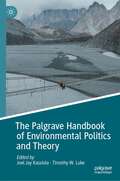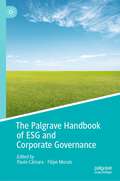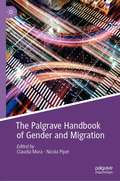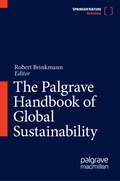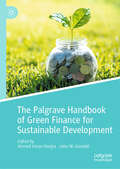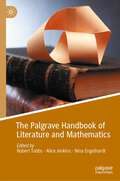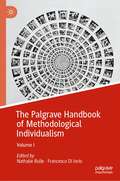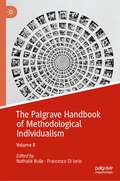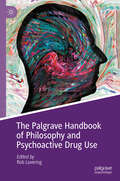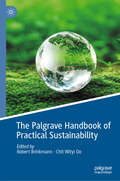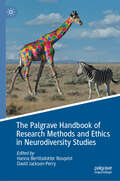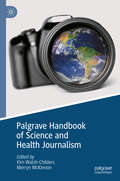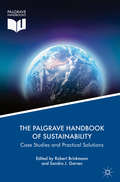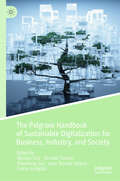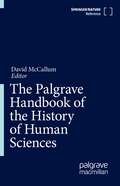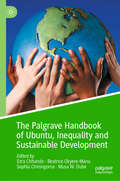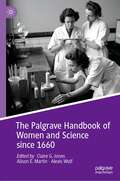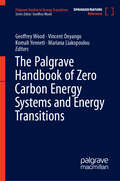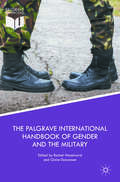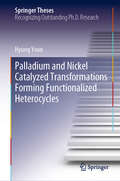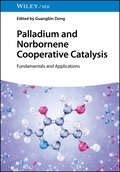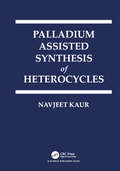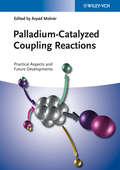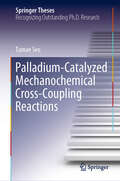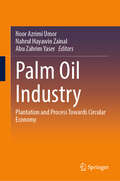- Table View
- List View
The Palgrave Handbook of Environmental Politics and Theory (Environmental Politics and Theory)
by Joel Jay Kassiola Timothy W. LukeThis Handbook aims to provide a unique and convenient one-volume reference work, exhibiting the latest interdisciplinary explorations in this urgently burgeoning field of intellectual and practical importance. Due to its immense range and diversity, environmental politics and theory necessarily encompasses: empirical, normative, policy, political, organizational, and activist discussions unfolding across many disciplines. It is a challenge for its practitioners, let alone newcomers, to keep informed about the ongoing developments in this fast-changing area of study and to comprehend all of their implications. Through the planned volume’s extensive scope of contributions emphasizing environmental policy issues, normative prescriptions, and implementation strategies, the next generation of thinkers and activists will have very useful profiles of the theories, concepts, organizations, and movements central to environmental politics and theory. It is the editors’ aspiration that this volume will become a go-to resource on the myriad perspectives relevant to studying and improving the environment for advanced researchers as well as an introduction to new students seeking to understand the basic foundations and recommended resolutions to many of our environmental challenges. Environmental politics is more than theory alone, so the Handbook also considers theory-action connections by highlighting the past and current: thinkers, activists, social organizations, and movements that have worked to guide contemporary societies toward a more environmentally sustainable and just global order. Chapter “Eco-Anxiety and the Responses of Ecological Citizenship and Mindfulness” is available open access under a Creative Commons Attribution 4.0 International License via link.springer.com.
The Palgrave Handbook of ESG and Corporate Governance
by Paulo Câmara Filipe MoraisSince the 2008 Global Financial Crisis the prevailing economic development model based on an assumption of unlimited resources and, therefore, unlimited growth has been increasingly put into question by academics, policy-making agencies and even industry leaders themselves. Climate change, general environmental and natural resource degradation, widespread inequalities, and systemic governance failures are pressing capitalism to renew itself to deliver sustainable outcomes for a broader base of stakeholders. This has become known in more practical terms as the ESG (Environmental, Social and Governance) and responsible investment movements. The pressure to change how we organise ourselves as societies and economies has implications for how large and small corporations, public or private, are governed and to the benefit of whom. This Handbook offers a rare combination of pluralistic and multidisciplinary perspectives from law, economics, finance and management, as well as an interesting mix of latest academic thinking and practical recommendations on ESG for boards and executive teams.Should companies be governed and managed for the benefit of their shareholders alone? Can companies be governed to deliver for shareholders as well as the broader stakeholder base? How can investors allocate capital to advance sustainability? Part I provides a pluralistic discussion of some of these fundamental questions besetting academics and practitioners alike while Part II examines recent regulatory developments and assesses what may need to change in terms of law and regulation to both hold companies to account for sustainability while enabling them to continue to provide vital goods and services. Part III of the book discusses how the different types of companies and investors are currently facing the sustainability imperative and incorporating ESG factors on how they operate and invest. The concluding chapter provides an overview of the key regulatory, ecosystem and board-level gaps that require urgent and decisive action.
The Palgrave Handbook of Gender and Migration
by Claudia Mora Nicola PiperThis handbook adopts a distinctively global and intersectional approach to gender and migration, as social class, race and ethnicity shape the process of migration in its multiple dimensions. A large range of topics exploring gender, sexuality and migration are presented, including feminist migration research, care, family, emotional labour, brain drain and gender, parenting, gendered geographies of power, modern slavery, women and refugee law, masculinities, and more. Scholars from North and South America, Europe, Asia, and Oceania delve into institutional, normative, and day-to-day practices conditioning migrants´ rights, opportunities and life chances based on material from around the world. This handbook will be of great interest to students and scholars across a range of disciplines, including Women’s and Gender Studies, Sociology, Sexuality Studies, Migration Studies, Politics, Social Policy, Public Policy, and Area Studies.
The Palgrave Handbook of Global Sustainability
by Robert BrinkmannThe field of sustainability continues to evolve as a discipline. The world is facing multiple sustainability challenges such as climate change, water depletion, ecosystem loss, and environmental racism. The Handbook of Sustainability will provide a comprehensive reference for the field that examines in depth the major themes within what are known as the three E’s of sustainability: environment, equity, and economics. These three themes will serve as the main organizing body of the work. In addition, the work will include sections on history and sustainability, major figures in the development of sustainability as a discipline, and important organizations that contributed or that continue to contribute to sustainability as a field. The work is explicitly global in scope as it considers the very different issues associated with sustainability in the global north and south
The Palgrave Handbook of Green Finance for Sustainable Development (Palgrave Studies in Impact Finance)
by Ahmed Imran Hunjra John W. GoodellThis book covers green finance with a focus on the environmental, social, and governance (ESG) consequences of green financing and its role in attaining sustainable development and a carbon-neutral economy. It provides research-based practical solutions for sustainable development, as well as insights from green finance, presenting a framework for studying green finance in the domains of accounting, banking, investing, and insurance. Of interest to academics, investors, and policymakers in green finance and development and alternative financing, the book features a global cast of contributors from both academia and practice.
The Palgrave Handbook of Literature and Mathematics
by Nina Engelhardt Alice Jenkins Robert TubbsThis handbook features essays written by both literary scholars and mathematicians that examine multiple facets of the connections between literature and mathematics. These connections range from mathematics and poetic meter to mathematics and modernism to mathematics as literature. Some chapters focus on a single author, such as mathematics and Ezra Pound, Gertrude Stein, or Charles Dickens, while others consider a mathematical topic common to two or more authors, such as squaring the circle, chaos theory, Newton’s calculus, or stochastic processes. With appeal for scholars and students in literature, mathematics, cultural history, and history of mathematics, this important volume aims to introduce the range, fertility, and complexity of the connections between mathematics, literature, and literary theory.
The Palgrave Handbook of Methodological Individualism: Volume I
by Nathalie Bulle Francesco Di IorioWhile methodological individualism is a fundamental approach within the social sciences, it is often misunderstood. This highlights the need for a discursive and up-to-date reference work analyzing this approach’s classic arguments and assumptions in the light of contemporary issues in sociology, economics and philosophy. This two-volume handbook presents the first comprehensive overview of methodological individualism. Chapters discuss historical and contemporary debates surrounding this central approach within the social sciences, as well as cutting edge developments related to the individualist tradition with philosophical and scientific implications. Bringing together multiple contributions from the world’s leading experts on this important tradition of theorizing, this collective endeavor provides teachers, researchers and students in sociology, economics, and philosophy with a reliable and critical understanding of the founding principles, key thinkers and intellectual development of MI since the late 19th century.
The Palgrave Handbook of Methodological Individualism: Volume II
by Nathalie Bulle Francesco Di IorioWhile methodological individualism is a fundamental approach within the social sciences, it is often misunderstood. This highlights the need for a discursive and up-to-date reference work analyzing this approach’s classic arguments and assumptions in the light of contemporary issues in sociology, economics and philosophy. This two-volume handbook presents the first comprehensive overview of methodological individualism. Chapters discuss historical and contemporary debates surrounding this central approach within the social sciences, as well as cutting edge developments related to the individualist tradition with philosophical and scientific implications. Bringing together multiple contributions from the world’s leading experts on this important tradition of theorizing, this collective endeavor provides teachers, researchers and students in sociology, economics, and philosophy with a reliable and critical understanding of the founding principles, key thinkers and intellectual development of MI since the late 19th century.
The Palgrave Handbook of Philosophy and Psychoactive Drug Use
by Rob LoveringIn this Handbook, philosophers from around the world address the metaphysics, epistemology, and value of psychoactive (mind-altering) drug use. In so doing, they attempt to answer questions such as: What does the fact of drug-induced mind-altering experiences tell us about natures of the mind, free will, and God? What does it tell us about what, and how, we can know? Are drug-induced mind-altering experiences valuable, morally, aesthetically, or otherwise? Is the acquisition of drug-induced mind-altering experiences ever immoral? Should the acquisition of drug-induced mind-altering experiences ever be legally prohibited? The Handbook gives an overview of the current research, and sets the stage for future directions in philosophical thought relating to psychoactive drug use.
The Palgrave Handbook of Practical Sustainability
by Robert Brinkmann Chit Wityi OoThis book provides a comprehensive look at practical sustainability around the world. The book takes a distinctly regional, case study perspective and highlights different approaches to managing sustainability challenges. Chapters by authors from all corners of the world look at a range of sustainability issues including environmental sustainability, environmental equity and justice, and government and business approaches to sustainability. The authorship of the book is distinctly global which provides an important perspective to this volume. Each chapter focuses on a different sustainability problem and how it was addressed in the region. Readers will take away a tremendous amount of information as to how sustainability challenges are addressed by leaders throughout the globe.
The Palgrave Handbook of Research Methods and Ethics in Neurodiversity Studies
by Hanna Bertilsdotter Rosqvist David Jackson-PerryThis timely volume brings together well-established scholars and emerging voices to explore research methods and ethics in Neurodiversity Studies. It explores the epistemic injustice that currently surrounds much knowledge production around neurodivergence, and offers concrete examples of creative, participatory, and collaborative research practice in the field. The editors have assembled chapters combining reflexive, theoretical, and practical contributions. Together they address current debates surrounding participatory methods and Neurodiversity Studies and are unique in giving voice to mainly neurodivergent researchers and contributors across autism, ADHD, acquired brain injury, and multiple neurodivergence. The first of its kind, this much-needed volume contains essential reading for all those learning and teaching in the field of neurodiversity. It further represents a valuable resource for students and academics at all levels, participatory or creative researchers, research commissioners, and research evidence users across the social sciences.
Palgrave Handbook of Science and Health Journalism
by Kim Walsh-Childers Merryn McKinnonThis handbook reviews the extant literature on the most important issues in health and science journalism, with a focus on summarizing the relevant research and identifying key questions that are yet to be answered. It explores challenges and best practices in health and science reporting, formats and audiences, key topics such as climate change, pandemics and space science, and the ethics and political impacts of science and health journalist practice. With numerous international contributions, it provides a comprehensive overview of an emerging area of journalism studies and science communication.
The Palgrave Handbook of Sustainability: Case Studies And Practical Solutions
by Robert Brinkmann Sandra J. GarrenThis book provides a comprehensive overview of the practice of sustainability through a diverse range of case studies spanning across varied fields and areas of expertise. It provides a clear indication as to the contemporary state of sustainability in a time faced by issues such as global climate change, challenges of environmental justice, economic globalization and environmental contamination. The Palgrave Handbook of Sustainability explores three broad themes: Environmental Sustainability, Social Sustainability and Economic Sustainability. The authors critically explore these themes and provide insight into their linkages with one another to demonstrate the substantial efforts currently underway to address the sustainability of our planet. This handbook is an important contribution to the best practises on sustainability, drawn from many different examples across the fields of engineering, geology, anthropology, sociology, biology, chemistry and religion.
The Palgrave Handbook of Sustainable Digitalization for Business, Industry, and Society
by Myriam Ertz Urvashi Tandon Shouheng Sun Joan Torrent-Sellens Emine SarigöllüThis handbook conceptualizes sustainable digitalization and discusses the role of digitalization in addressing business and societal challenges. Divided into eight sections, the book opens by an introductory chapter examining the theoretical foundations of the field. Part 1 explores the first dimension of sustainable digitalization, namely digitalization for sustainability (DFS) or how digitalization could address several of the sustainable development goals. Part 2 addresses the second dimension of sustainable digitalization. Titled responsible digital (RD), it covers the potential risks of increased digitalization and outlines strategies for governing digitalization for sustainable development to avoid the risks summarized earlier in the book. Tying digitalization to such topics as smart agriculture, industry 4.0, education, ecological transition, climate, clean water, food production, and social well-being, this handbook provides a framework for the emerging field of sustainable digitalization.
The Palgrave Handbook of the History of Human Sciences
by David McCallumThe Palgrave Handbook of the History of Human Sciences offers a uniquely comprehensive and global overview of the evolution of ideas, concepts and policies within the human sciences. Drawn from histories of the social and psychological sciences, anthropology, the history and philosophy of science, and the history of ideas, this collection analyses the health and welfare of populations, evidence of the changing nature of our local communities, cities, societies or global movements, and studies the way our humanness or ‘human nature’ undergoes shifts because of broader technological shifts or patterns of living. This Handbook serves as an authoritative reference to a vast source of representative scholarly work in interdisciplinary fields, a means of understanding patterns of social change and the conduct of institutions, as well as the histories of these ‘ways of knowing’ probe the contexts, circumstances and conditions which underpin continuity and change in the way we count, analyse and understand ourselves in our different social worlds. It reflects a critical scholarly interest in both traditional and emerging concerns on the relations between the biological and social sciences, and between these and changes and continuities in societies and conducts, as 21st century research moves into new intellectual and geographic territories, more diverse fields and global problematics.
The Palgrave Handbook of Ubuntu, Inequality and Sustainable Development
by Ezra Chitando Beatrice Okyere-Manu Sophia Chirongoma Musa W. DubeThe Palgrave Handbook of Ubuntu, Inequality and Sustainable Development interrogates the multiple inequalities that subsist in the world and explores how Ubuntu, emerging from Africa but being potentially applicable elsewhere, holds promise for mitigation and resolution. It highlights inequalities that relate to gender, climate change, the environment, race, migration, and the struggle against poverty. It reflects on how and the extent to which Ubuntu can be a strategic resource in pursuit of equality and justice.
The Palgrave Handbook of Women and Science since 1660
by Alison E. Martin Claire G. Jones Alexis WolfThis handbook provides a comprehensive overview of core areas of investigation and theory relating to the history of women and science. Bringing together new research with syntheses of pivotal scholarship, the volume acknowledges and integrates history, theory and practice across a range of disciplines and periods. While the handbook’s primary focus is on women's experiences, chapters also reflect more broadly on gender, including issues of femininity and masculinity as related to scientific practice and representation. Spanning the period from the birth of modern science in the late seventeenth century to current challenges facing women in STEM, it takes a thematic and comparative approach to unpack the central issues relating to women in science across different regions and cultures. Topics covered include scientific networks; institutions and archives; cultures of science; science communication; and access and diversity. With its breadth of coverage, this handbook will be the go-to resource for undergraduates taking courses on the history and philosophy of science and gender history, while at the same time providing the foundation for more advanced scholars to undertake further historical and theoretical investigation.
The Palgrave Handbook of Zero Carbon Energy Systems and Energy Transitions (Palgrave Studies in Energy Transitions)
by Geoffrey Wood Vincent Onyango Komali Yenneti Mariana LiakopoulouThe Palgrave Handbook of Zero-Carbon Energy Systems and Energy Transitions provides a comprehensive and authoritative source of information, analysis and recommendations on the multi- and inter-disciplinary subject of zero carbon energy systems. The Handbook will advance thinking and research underlying the on-going energy transition by; covering a wide range of energy technologies and sources (e.g. fossil fuels, renewables, low carbon energy) including investigating the potential of new and alternative technologies and fuel sources and looking at the power, heating/cooling and transport sectors; Looking at varied legal jurisdictions and governance approaches including developing and developed countries and investigating potential new approaches to achieving a zero carbon energy system; Providing a broad range of theoretical and methodological approaches from a range of disciplines; Inclusion of a global range of case studies from Africa, Arctic, Asia, Australasia, Europe, the Middle East, the Americas (Central, North and South) and the Pacific, from the international, national, sub-national to city/community level.
The Palgrave International Handbook of Gender and the Military
by Rachel Woodward Claire DuncansonThe Palgrave International Handbook of Gender and the Military provides a comprehensive overview of the multiple ways in which gender and militaries connect. International and multi-disciplinary in scope, this edited volume provides authoritative accounts of the many intersections through which militaries issues and military forces are shaped by gender. The chapters provide detailed accounts of key issues, informed by examples from original research in a wealth of different national contexts. This Handbook includes coverage of conceptual approaches to the study of gender and militaries, gender and the organisation of state military forces, gender as it pertains to military forces in action, transitions and transgressions within militaries, gender and non-state military forces, and gender in representations of military personnel and practices. With contributions from a range of both established and early career scholars, The Palgrave International Handbook of Gender and the Military is an essential guide to current debates on gender and contemporary military issues.
Palladium and Nickel Catalyzed Transformations Forming Functionalized Heterocycles (Springer Theses)
by Hyung YoonThis book presents Pd- and Ni-catalyzed transformations generating functionalized heterocycles. Transition metal catalysis is at the forefront of synthetic organic chemistry since it offers new and powerful methods to forge carbon–carbon bonds in high atom- and step-economy. In Chapter 1, the author describes a Pd- and Ni-catalyzed cycloisomerization of aryl iodides to alkyl iodides, known as carboiodination. In the context of the Pd-catalyzed variant, the chapter explores the production of enantioenriched carboxamides through diastereoselective Pd-catalyzed carboiodination. It then discusses Ni-catalyzed reactions to generate oxindoles and an enantioselective variant employing a dual ligand system. Chapter 2 introduces readers to a Pd-catalyzed diastereoselective anion-capture cascade. It also examines diastereoselective Pd-catalyzed aryl cyanation to synthesize alkyl nitriles, a method that generates high yields of borylated chromans as a single diastereomer, and highlights its synthetic utility. Lastly, Chapter 3 presents a Pd-catalyzed domino process harnessing carbopalladation, C–H activation and π-system insertion (benzynes and alkynes) to generate spirocycles. It also describes the mechanistic studies performed on these reactions.
Palladium and Norbornene Cooperative Catalysis: Fundamentals and Applications
by Guangbin DongA comprehensive exploration of Pd/Norbornene (NBE) catalysis In Palladium and Norbornene Cooperative Catalysis: Fundamentals and Applications, renowned researcher Professor Guangbin Dong delivers a systematic and comprehensive discussion of Pd/NBE catalysis, including its mechanisms, scopes, applications, and current limitations. The book provides readers with the fundamental knowledge they will need to use this type of catalysis in their own research, as well as how to choose the best reaction conditions and catalyst combinations. Each of the eight chapters are written by leading experts in the Pd/NBE catalysis field. They cover topics ranging from the mechanistic foundation of Pd/NBE catalysis to the scope of the ipso and ortho functionalization, asymmetric development, a review of the Pd/NBE-catalyzed heteroarene functionalization, and more. Readers will also find: A thorough introduction to intramolecular and intermolecular cyclizationsComprehensive explorations of the annulation chemistryPractical discussions of Pd(II)-initiated reactionsA complete summary of a variety of applications in the synthesis of complex molecules and organic materials using Pd/NBE catalysis Perfect for chemistry students with an interest in transition-metal catalysis and organic synthesis. This book will also benefit academic researchers and practicing chemists.
Palladium Assisted Synthesis of Heterocycles
by Navjeet KaurThis book is a compilation of the recent applications of palladium catalysts in organic synthesis. The book demonstrates that it is a highly dynamic research field. This methodology has emerged as a powerful tool for the efficient and chemoselective synthesis of heterocyclic molecules. In the past few years, several strategies have been pointed out to pursue more efficient, sustainable, and environment friendly chemical processes. Among those strategies, catalysis and the design of new processes that avoid the use of toxic reagents have been the focus of intense research.
Palladium-Catalyzed Coupling Reactions
by Árpád MolnárThis handbook and ready reference brings together all significant issues of practical importance in selected topics discussing recent significant achievements for interested readers in one single volume. While covering homogeneous and heterogeneous catalysis, the text is unique in focusing on such important aspects as using different reaction media, microwave techniques or catalyst recycling. It also provides a comprehensive treatment of key issues of modern-day coupling reactions having emerged and matured in recent years and emphasizes those topics that show potential for future development, such as continuous flow systems, water as a reaction medium, and catalyst immobilization, among others.With its inclusion of large-scale applications in the pharmaceutical industry, this will equally be of great interest to industrial chemists.From the contents* Palladium-Catalyzed Cross-Coupling Reactions - A General Introduction* High-turnover Heterogeneous Palladium Catalysts in Coupling Reactions: the Case of Pd Loaded on Dealuminated Y Zeolites Palladium-Catalyzed Coupling Reactions with Magnetically Separable Nanocatalysts* The Use of Ordered Porous Solids as Support Materials in Palladium-Catalyzed Cross-Coupling Reactions* Coupling Reactions Induced by Polymer-Supported Catalysts* Coupling Reactions in Ionic Liquids* Cross-Coupling Reactions in Aqueous Media* Microwave-Assisted Synthesis in C-C and C-Heteroatom Coupling Reactions* Catalyst Recycling in Palladium-Catalyzed Carbon-Carbon Coupling Reactions* Nature of the True Catalytic Species in Carbon-Carbon Coupling Reactions with* Heterogeneous Palladium Precatalysts* Coupling Reactions in Continuous Flow Systems* Large-Scale Applications of Palladium-Catalyzed Couplings in the Pharmaceutical Industry
Palladium-Catalyzed Mechanochemical Cross-Coupling Reactions (Springer Theses)
by Tamae SeoIn this thesis, the author developed cross-coupling reactions that proceed in the solid state without using organic solvents, utilizing a mechanochemical synthesis method using a ball mill. Compared to conventional solution systems, the reactions realized a drastic reduction of chemical waste, a drastic acceleration of chemical reactions, and efficient transformations of insoluble compounds. The thesis demonstrates that mechanochemical synthesis method has the potential to revolutionize organic synthesis. Readers can learn not only about mechanochemical synthesis but also about new reactions and syntheses of new compounds that could not be obtained under solution conditions. Recently, mechanochemical synthesis has become increasingly popular among a wide range of researchers as an environmentally friendly and highly efficient method, so this thesis has a timely publication.
Palm Oil Industry: Plantation and Process Towards Circular Economy
by Noor Azrimi Umor Nahrul Hayawin Zainal Abu Zahrim YaserThis book highlights current efforts and research on sustainable solutions for the palm oil industry, including production and waste management. It provides an overview of sustainable principles and practices within the industry and explores ongoing initiatives to utilize various oil palm waste. In addition to extraction of lignin and cellulose, the book also discusses the use of oil palm biomass for environmental remediation.
